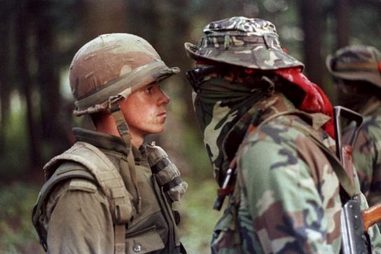The Law of the Land: Spotlight on 2013 Writers Retreat & Festival of New Plays
The plays chosen for this year’s Retreat & Festival dive
headfirst into current polarizing political issues. For example, Vickie Ramirez’s
play, Stand-Off at Hwy#37, deals with
conflict between the National Guard and Haudenosaunee protesters on a
reservation in upstate New York. Where
Have All the Warriors Gone? by Darrell Dennis features political
activism and tribal law in North America as major themes.
Check out this quick guide to some major ideas, people, and
events that are referenced in this year’s Retreat & Festival plays…
Tribal Sovereignty
The U.S. Government officially categorized Native
American tribes as “domestic dependent nations” in 1831. Tribes are sovereign entities; they make their laws and rulings independently of the U.S.
Government. States may not impose regulations on tribes. However, the power of
tribal governments is not absolute. Congress may intervene or overrule tribal
law in the event of incidents that involve non-Indians, for example, as in Oliphant vs. Saquamish Indian Tribe,
1978. For more explanation, see this helpful page from the Native American Caucus of the California Democratic Party. See also: “Tribal Sovereignty and State Authority,” and “Tribal Sovereignty and Jurisdiction: It’s a Matter of Trust."
The Oka Crisis
 |
| [Source] |
This famous standoff occurred in the summer of 1990 in Oka, Quebec, Canada. Mohawk protestors challenged the construction of a golf course over traditional burial ground. When construction crews came into the disputed area, Mohawk protestors put up barricades against the bulldozers. The Quebec Police and Canadian Armed Forces were sent in to control the situation. Construction was permanently stopped, but it came at the cost of a 78-day standoff, police brutality, and one death. For more information and video, see the CBC Digital Archives. See also: Warrior Publications' blogpost, "Oka Crisis, 1990", and the Global Non-Violent Action Database.
Wounded Knee
In the late 1960s, the American Indian Movement was founded to fight injustice against Native Americans in the legal system. Led by Leonard Peltier and Dennis Banks, to name a few, AIM also fought against poor living conditions on reservations. In response to corruption and mismanagement in the tribal government, AIM and Oglala Lakota occupied Wounded Knee in 1973. U.S. Armed Forces blocked roads and cut off supplies to the area, putting Wounded Knee under siege for 71 days.
| [Source] |
During and after the siege, hundreds of arrests were made, though few people were convicted of any crime. Unsolved disappearances and harassment of Native people by police also followed the siege. AIM leader Leonard Peltier was accused in the shooting of two FBI agents in a gunfight in 1975. Peltier was sentenced to prison for life in a much-contested trial. Amnesty International considers him a political prisoner who should be released. His supporters maintain his innocence and continue to fight for his release.
The most recent news about Wounded Knee is a controversial plan to sell a piece of the historic landmark. See Native American Times. For more research about Wounded Knee, see The History Channel on Wounded Knee; see also "Wounded Knee Siege: 1973."
Idle No More
A contemporary movement, Idle No More is an organized protest group comprised of First Nations and other aboriginal people of Canada. They oppose the encroachment of the Canadian government on treaties and agreements made with First Nations people, in an effort to protect environmental resources and rights. Idle No More's members have organized protests on a volunteer basis worldwide. To follow the activities of Idle No More, see their Facebook page, or their official website.
To learn even more about these issues and events, come check out our Festival of New Plays at The Autry in Los Angeles, or at La Jolla Playhouse in San Diego, now through June 1st!